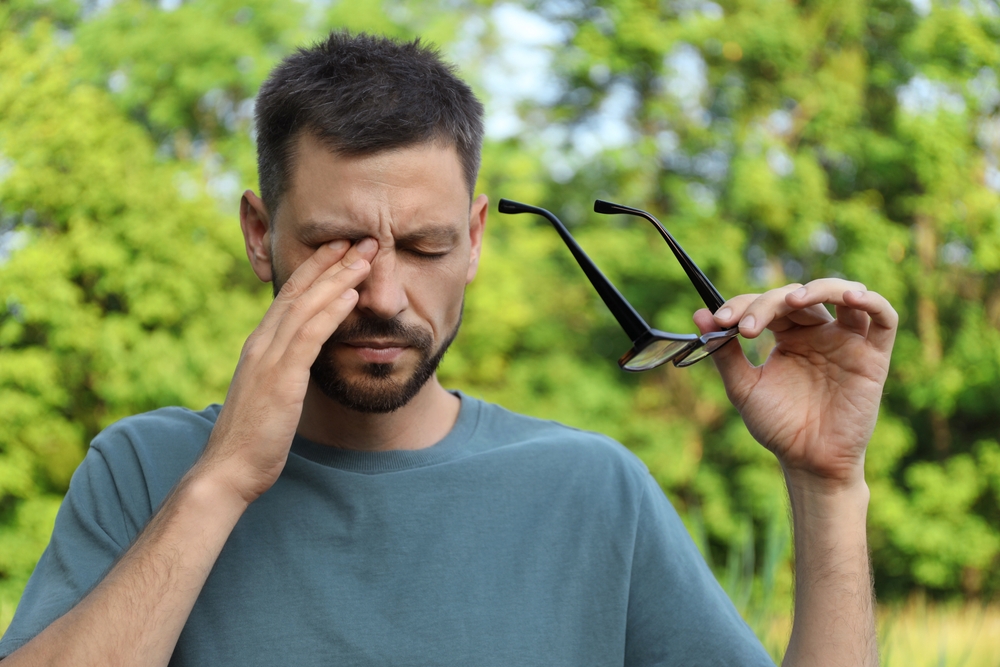
Dry eye is a common condition that occurs when your eyes do not produce enough tears or when the tears evaporate too quickly. Dry eye is more than just a minor inconvenience - it can significantly impact your quality of life, making it difficult to perform everyday tasks and enjoy activities you once loved.
The tear film that coats your eyes is composed of three layers: an outer oily layer, a middle watery layer, and an inner mucus layer. When this delicate balance is disrupted, it can lead to dry eye. Factors like age, certain medical conditions, and environmental factors can all contribute to the development of dry eye.
Understanding the underlying causes of your dry eye is the first step in finding an effective solution. By addressing the root of the problem, you can take control of your eye health and find relief from the discomfort of dry eye.
Common Symptoms of Dry Eye
If you're experiencing any of the following symptoms, it's possible that you may be dealing with dry eye:
• Persistent eye irritation or discomfort
• Redness or inflammation in the eyes
• Burning, stinging, or a gritty feeling in the eyes
• Blurred vision
• Sensitivity to light
• Excessive tearing
• Feeling of having something in your eye
• Difficulty wearing contact lenses
These symptoms can range from mild to severe and can significantly impact your daily life. If you're experiencing any of these issues, it's important to seek the guidance of an optometrist.
Lifestyle Choices That Impact Dry Eye
Your diet and hydration levels can play a significant role in the health of your eyes and the development of dry eye. Certain nutrients, such as omega-3 fatty acids, can help support the production and quality of your tear film, while other dietary choices can exacerbate dry eye symptoms. To support your eye health, consider incorporating the following dietary changes:
• Increase your intake of omega-3 fatty acids, which can be found in foods like fatty fish, walnuts, and flaxseeds.
• Eat a variety of antioxidant-rich fruits and vegetables, such as leafy greens, berries, and citrus fruits.
• Stay hydrated by drinking plenty of water throughout the day, as dehydration can lead to reduced tear production and increased evaporation.
In addition to your diet and hydration levels, your sleep and stress levels can also have a significant impact on the health of your eyes and the development of dry eye.
Adequate sleep is essential for the proper functioning of your tear glands and the production of tears. When you don't get enough sleep, your tear production can decrease, leading to dry eye. Aim for 7-9 hours of quality sleep each night to support your eye health.
Stress can also be a contributing factor to dry eye. When you're under stress, your body releases hormones that can disrupt the delicate balance of your tear film. Additionally, stress can lead to behaviors that exacerbate dry eye, such as reduced blinking and increased eye strain from prolonged screen time.
Environmental Factors That Contribute to Dry Eye
Your environment can also play a significant role in the development and exacerbation of dry eye. Factors such as air quality, temperature, and humidity can all impact the health of your eyes and the stability of your tear film.
For example, exposure to dry, air-conditioned environments, harsh winds, or excessive screen time can all contribute to increased tear evaporation and dry eye symptoms. Additionally, certain occupations or hobbies that involve prolonged exposure to chemicals, dust, or other irritants can also lead to dry eye.
To mitigate the impact of environmental factors on your eye health, consider the following strategies:
• Use a humidifier to maintain appropriate moisture levels in your living and working spaces.
• Limit your exposure to harsh environmental conditions, such as windy or dry climates, when possible.
• Take regular breaks from digital screens and ensure proper lighting and ergonomic positioning to reduce eye strain.
• Wear protective eyewear, such as sunglasses or goggles, when engaging in activities that may expose your eyes to irritants or harsh environmental conditions.
By being mindful of your environment and making adjustments to reduce exposure to dry, irritating conditions, you can help support the health of your eyes and manage the symptoms of dry eye.
The Importance of Proper Diagnosis for a Personalized Treatment Plan
Addressing dry eye effectively requires a comprehensive approach that takes into account your individual needs and the underlying causes of your condition. During your eye examination, your eye doctor will assess the health of your tear film, measure the production and quality of your tears, and evaluate any underlying factors that may be contributing to your dry eye. This comprehensive evaluation will help them determine the root cause of your dry eye and develop a tailored treatment plan to address your specific needs.
Depending on the severity of your dry eye and the underlying causes, your treatment plan may include a combination of the following:
• Prescription eye drops or ointments to address inflammation or increase tear production
• Applying warm compresses to your eyes and maintaining proper eyelid hygiene can help improve the quality of your tear film and reduce inflammation.
• Certain dietary supplements, such as high quality omega-3 fatty acids, can help support the production and quality of your tears. We recommend the highest quality sources.
• Our in-office procedures offer the latest in technology of dry eye treatment including Intense Pulse Light Therapy.
• By working closely with your doctor and following their recommended treatment plan, you can take control of your dry eye and find lasting relief from the discomfort and inconvenience it can cause.
Taking Control of Your Dry Eye Through Lifestyle Choices
Dry eye is a complex condition that can have a significant impact on your quality of life, but the good news is that there are steps you can take to manage your symptoms and support the health of your eyes. By understanding the underlying causes of your dry eye, making lifestyle adjustments, and working closely with your eye doctor, you can take control of your eye health and find lasting relief.
If you're struggling with dry eye, contact Family Vision Care of Richmond. We will work with you to develop a personalized treatment plan that addresses the root causes of your dry eye and provides you with the relief you need. Visit our office or call (804) 217-9883 to schedule your appointment and take the first step towards healthier, more comfortable eyes.






